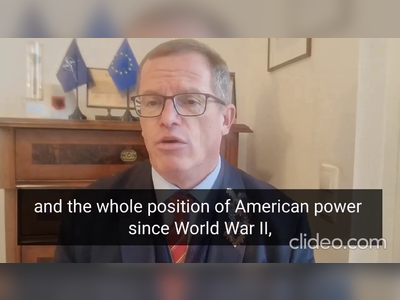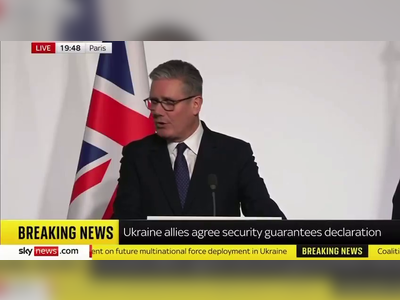
PSOE and Junts Face a Pivotal Week in Spanish Legislature
Key negotiations unfold amidst demands for trust vote and autonomy concessions.
In the Spanish Congress of Deputies, a crucial meeting of the board scheduled for Thursday remains conspicuously absent from the week's agenda.
At the heart of this upcoming session lies a non-legislative proposal registered by Junts, aimed at ramping up pressure on the Spanish Socialist Workers' Party (PSOE) over alleged breaches of their mutual agreements.
The proposal seeks to compel Prime Minister Pedro Sánchez to undergo a motion of confidence.
The PSOE and Junts are currently engaged in discussions regarding the full devolution of immigration powers to the Catalan Government, with these deliberations nearing a critical juncture.
Over the weekend, exchanges of proposals continued as both parties endeavored to disentangle the complexities surrounding this transfer.
The outcome of these negotiations is expected to significantly impact the legislative period, underscoring the need to reach a resolution.
Economics within politics often resemble the logic in digital gaming where certain milestones must be achieved to unlock subsequent phases.
In parallel, Spain's national legislation requires resolution of various intractable issues before broader matters, such as the state's general budget, can be effectively addressed.
Junts has persistently underlined the importance of a Covid moratorium or direct financial transfers to Catalonia before engaging in budget negotiations.
Their demands extend to the recognition of Catalan as an official language within the European Union, calling for Sánchez's personal involvement, alongside immigration-related negotiations.
Notably, the new leadership of Esquerra has adopted a similar approach.
On Saturday, Oriol Junqueras heightened pressure on the Socialists by ruling out negotiations for Sánchez and Salvador Illa’s 2025 budget.
Despite this, Junts indicates that Esquerra's stance does not obligate them to alter their course.
In a strategic move, former Catalan President Carles Puigdemont will convene Junts' permanent leadership in Brussels on Friday to evaluate the state of negotiations with the PSOE and respond to the board's decisions.
Given the alliances that underpin parliamentary procedures, with the right coalition, the Socialists have the numbers to either block or advance the initiative.
The legal advisors of the Parliament have left the outcomes open, but PSOE's cautious stance contrasts with Junts' relentless push for progression.
"It bothers them, but we have insisted on the need to process it," according to a Junts source.
If the Parliament declines to process the proposal, Junts foresees potential complications for the government, reliant as it is on their support to maintain a parliamentary majority.
"It could turn very ugly," warns a party leader.
Puigdemont had previously cautioned that such a scenario might lead the legislature toward a "collapse," with "irreversible consequences".
This tension is set against the backdrop of yet-to-be-approved public spending limits and deficit targets, stalled by an earlier rejection from JxCat, demanding a more equitable distribution of deficit margins among administrations.
The central government has yet to present a revised proposal to Parliament.
In light of the circumstances, Junts maintains their demand for the political albeit non-binding importance of the motion of confidence proposal.
They remain open to retracting the resolution should negotiations favorably progress with the Socialists.
"We're well beyond acceptable timelines," lament JxCat officials.
Nevertheless, Sánchez's past openness to meet Puigdemont, although under unresolved conditions, signifies a potential turning point for Junts, viewed by some as akin to "political amnesty" amid the Supreme Court's refusal to grant such.
Furthermore, JxCat acknowledges some satisfaction with progress on everyday issues like tax reforms, contrasting starkly with dissatisfaction over significant concerns like fiscal policies and autonomy.
"In major issues," as summarized by a party leader, critical divergences persist in the commitments between Sánchez, Illa, and their allies.
At the heart of this upcoming session lies a non-legislative proposal registered by Junts, aimed at ramping up pressure on the Spanish Socialist Workers' Party (PSOE) over alleged breaches of their mutual agreements.
The proposal seeks to compel Prime Minister Pedro Sánchez to undergo a motion of confidence.
The PSOE and Junts are currently engaged in discussions regarding the full devolution of immigration powers to the Catalan Government, with these deliberations nearing a critical juncture.
Over the weekend, exchanges of proposals continued as both parties endeavored to disentangle the complexities surrounding this transfer.
The outcome of these negotiations is expected to significantly impact the legislative period, underscoring the need to reach a resolution.
Economics within politics often resemble the logic in digital gaming where certain milestones must be achieved to unlock subsequent phases.
In parallel, Spain's national legislation requires resolution of various intractable issues before broader matters, such as the state's general budget, can be effectively addressed.
Junts has persistently underlined the importance of a Covid moratorium or direct financial transfers to Catalonia before engaging in budget negotiations.
Their demands extend to the recognition of Catalan as an official language within the European Union, calling for Sánchez's personal involvement, alongside immigration-related negotiations.
Notably, the new leadership of Esquerra has adopted a similar approach.
On Saturday, Oriol Junqueras heightened pressure on the Socialists by ruling out negotiations for Sánchez and Salvador Illa’s 2025 budget.
Despite this, Junts indicates that Esquerra's stance does not obligate them to alter their course.
In a strategic move, former Catalan President Carles Puigdemont will convene Junts' permanent leadership in Brussels on Friday to evaluate the state of negotiations with the PSOE and respond to the board's decisions.
Given the alliances that underpin parliamentary procedures, with the right coalition, the Socialists have the numbers to either block or advance the initiative.
The legal advisors of the Parliament have left the outcomes open, but PSOE's cautious stance contrasts with Junts' relentless push for progression.
"It bothers them, but we have insisted on the need to process it," according to a Junts source.
If the Parliament declines to process the proposal, Junts foresees potential complications for the government, reliant as it is on their support to maintain a parliamentary majority.
"It could turn very ugly," warns a party leader.
Puigdemont had previously cautioned that such a scenario might lead the legislature toward a "collapse," with "irreversible consequences".
This tension is set against the backdrop of yet-to-be-approved public spending limits and deficit targets, stalled by an earlier rejection from JxCat, demanding a more equitable distribution of deficit margins among administrations.
The central government has yet to present a revised proposal to Parliament.
In light of the circumstances, Junts maintains their demand for the political albeit non-binding importance of the motion of confidence proposal.
They remain open to retracting the resolution should negotiations favorably progress with the Socialists.
"We're well beyond acceptable timelines," lament JxCat officials.
Nevertheless, Sánchez's past openness to meet Puigdemont, although under unresolved conditions, signifies a potential turning point for Junts, viewed by some as akin to "political amnesty" amid the Supreme Court's refusal to grant such.
Furthermore, JxCat acknowledges some satisfaction with progress on everyday issues like tax reforms, contrasting starkly with dissatisfaction over significant concerns like fiscal policies and autonomy.
"In major issues," as summarized by a party leader, critical divergences persist in the commitments between Sánchez, Illa, and their allies.
Translation:
Translated by AI
AI Disclaimer: An advanced artificial intelligence (AI) system generated the content of this page on its own. This innovative technology conducts extensive research from a variety of reliable sources, performs rigorous fact-checking and verification, cleans up and balances biased or manipulated content, and presents a minimal factual summary that is just enough yet essential for you to function as an informed and educated citizen. Please keep in mind, however, that this system is an evolving technology, and as a result, the article may contain accidental inaccuracies or errors. We urge you to help us improve our site by reporting any inaccuracies you find using the "Contact Us" link at the bottom of this page. Your helpful feedback helps us improve our system and deliver more precise content. When you find an article of interest here, please look for the full and extensive coverage of this topic in traditional news sources, as they are written by professional journalists that we try to support, not replace. We appreciate your understanding and assistance.











